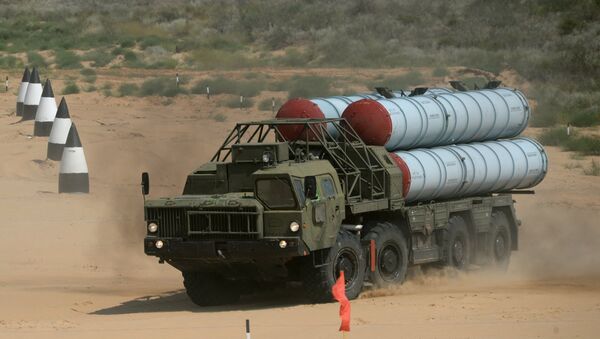During a Monday briefing, Russian Defense Minister Sergei Shoigu said Moscow will deliver the S-300 air defence systems to Syria within two weeks as an adequate response to Israel's role in the downing of the Russian Il-20 plane last week.
"The Syrian Armed Forces will be supplied with the advanced S-300 air defence missile system within two weeks. It is capable of intercepting air threats at a range of more than 250 kilometers and simultaneously hitting several aerial targets," Shoigu said, adding that the S-300 would significantly boost Syria's combat capabilities.
Furthermore, Shoigu emphasized that command posts of the Syrian air defence forces would be equipped with automatic equipment that would ensure the identification of Russian aircraft by Syrian air defences.
"Command posts of the Syrian troops and military air defence units will be equipped with automatic control system, which have been supplied only to the Russian Armed Forces. This will ensure the centralized management of all Syrian air defence forces and facilities, monitoring of the situation in the airspace and prompt target designation. Most importantly, it will ensure identification of all Russian aircraft by the Syrian air defence forces," Shoigu said.
READ MORE: Russian MoD: Israel Violated Agreement With Russia to Prevent Incidents in Syria
Russia to Jam Navigation, Radars of Planes Attacking Syria
The minister stated that Russia would jam satellite navigation, on-board radars and communication systems of combat aviation over the waters of the Mediterranean Sea.
"Russia will jam satellite navigation, on-board radars and communication systems of combat aircraft, which attack targets in the Syrian territory, in the regions over the waters of the Mediterranean Sea bordering with Syria," Shoigu said.
Measures That Will Cool Hotheads
He proceeded to say that Moscow had halted the delivery of S-300s to Damascus back in 2013 at Israel's request, but the situation around the delivery has changed "through no fault of Russia."
READ MORE: Israel Can't Get Away With Il-20 Downing in Syria – IR Scholars
According to the minister, an Israeli F-16 jet used the Russian Il-20 aircraft as a shield, which resulted in the downing of the plane by Syrian air defense systems.
"This forced us to take an adequate response aimed at improving the security of Russian troops performing tasks to combat international terrorism in Syria," he said at the briefing.
Shoigu further stressed that if measures taken by Russia following the Il-20 crash over the Mediterranean fail to cool "hotheads," "we will have to respond in line with the situation."
"We are convinced that the implementation of these measures will cool hotheads and prevent ill-considered actions threatening our servicemen. Otherwise we will have to respond in line with the current situation," Shoigu stated.
Addressing the possibility of high-level contacts between Russia and Israel following the announcement by the defense minister, Kremlin spokesman Dmitry Peskov said that Moscow would inform if there were any, adding that the decision was not directed at any third country.
Earlier this week, the Russian Defense Ministry accused the Israeli Air Force of providing misleading information about the area of the planned airstrikes on Syrian targets, thereby violating its agreement with Russia. Shortly after that, Israeli Defense Minister Avigdor Lieberman stated that Tel Aviv would continue its military operation in Syria despite the Il-20 incident.
“We won’t let Syria be turned into a main Iranian military facility against the Israeli state. We continue to act… and we have all the necessary means and opportunities to this end,” he said.
Il-20 Downing
The ministry stressed that the Israeli Air Force used the Russian reconnaissance plane as a cover, thus subjecting it to an attack by the Syrian air defenses, with a Syrian S-200 surface-to-air missile hitting the Russian Il-20 while trying to repel Israeli strikes. Israel, for its part, insisted that Syria was responsible for the downing and that by the time the plane was destroyed, the four F-16 were already on their way home.
An initial inquiry of the incident suggests:
— Israel Defense Forces (@IDFSpokesperson) 18 сентября 2018 г.
1. Extensive and inaccurate Syrian anti-aircraft (Surface to Air missile) fire caused the Russian plane to be hit and downed.
2. When the Syrian Army launched the missiles that hit the Russian plane, IAF jets were already within Israeli airspace.
— Israel Defense Forces (@IDFSpokesperson) 18 сентября 2018 г.
3. During the strike against the target in Latakia, the Russian plane that was then hit was not within the area of the operation.
4. The Syrian anti-air batteries fired indiscriminately and from what we understand, did not bother to ensure that no Russian planes were in the air.
— Israel Defense Forces (@IDFSpokesperson) 18 сентября 2018 г.




